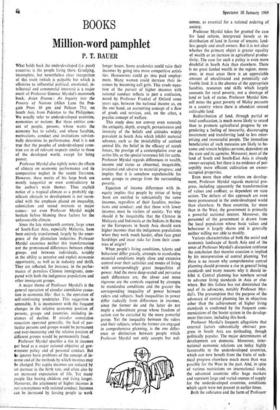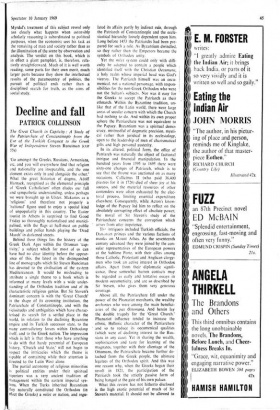Million-word pamphlet BOOKS
P. T. BAUER
What holds back the underdeveloped (i.e. poor) countries is the people living there. Grudging, incomplete, but nevertheless clear recognition of this truth (which is palpable but which is offensive to influential political, emotional, in- tellectual and commercial interests) is a major merit of Professor Gunnar Myrdal's mammoth book, Asian Drama: An Inquiry into the Poverty of Nations (Allen Lane the Pen- guin Press 10 gns and Pelican 75s), on South Asia from Pakistan to the Philippines.- We usually refer to underdeveloped countries, economies or nations. But these entities con- sist of people, persons, whose wants the economy has to satisfy, and whose faculties, motivations, conduct and institutions substan- tially determine its performance. Ahd it is not true that the peoples of underdeveloped coun- tries are in all relevant respects similar to those of the developed world, except for being poorer.
Professor Myrdal also rightly notes the effects of climate on economic performance and its comparative neglect in the recent literature. However, these merits of his large book are mostly tangential or even contradictory to the author's main themes. Thus explicit notice of a tropical climate as a probably sig- nificant obstacle to development is not recon- ciled with the emphasis placed on inequality, colonialism and vested interests as major causes : yet even Professor Myrdal might hesitate before blaming these factors for the unfavourable climate.
Since the late nineteenth century, large areas of South-East Asia, especially Malaysia, have been entirely transformed, largely by the emer- gence of the plantation industries. Professor Myrdal examines neither this transformation nor the pronounced differences between ethnic groups and between individuals, notably in the ability to perceive and exploit economic opportunity, as well as in industry and thrift. They are reflected, for instance, in the perfor- mance of penniless Chinese immigrants, dam- pared with both the indigenous populations and other immigrant groups.
A major theme of Professor Myrdal's is the general operation of circular cumulative causa- tion in economic life: that is, the operation of self-reinforcing tendencies. This suggestion is untenable. It is inconsistent with the frequent changes in the relative economic position of persons, groups and countries, including in-. stances of decline. If circular cumulative causation operated generally, the lead of par- ticular persons and groups would be permanent and ever-increasing and the relative position of different groups would be permanently fixed.
Professor Myrdal specifies a rise in incomes per head as a major rational objective of gov- ernment policy and of personal conduct. But be ignores basic problems of the concept of in- come and of the methods by which incomes may be changed. Per capita incomes are reduced by an increase in the birth rate, and often also by an increased expectation of life. Yet many people like having children and living longer. Moreover, the attainment of higher incomes is not synonymous with rational conduct. Incomes can be increased by forcing people to work
longer hours. Some academics could raise their incomes by going into more competitive activi- ties. Housewives could go into paid employ- ment. Many women could increase their in- comes by becoming call girls. This crude equa- tion of the pursuit of higher incomes with rational conduct reflects in part a confusion, noted by Professor Frankel of Oxford some years ago, between the national income as, on the one hand, an accounting concept of a flow of goods and services, and, on the other, a psychic concept of welfare.
This study does not convey even remotely the antiquity, depth, strength, pervasiveness and intensity of the beliefs and attitudes widely prevalent in South Asia which inhibit material advance, such as the inviolability of sentient animal life, the belief in the efficacy of occult forces, the prestige of a contemplative over an active life, or the special reverence felt for cattle.
Professor Myrdal regards differences in wealth, income and status as abnormal, inequitable, irrational and adverse to material progress; and implies that it is somehow reprehensible for some groups to emerge from the surrounding poverty.
Equation of income differences with in- equity implies that people by virtue of being born are entitled to substantially the same incomes, regardless of their faculties, motiva-
tions and conduct; and that those with lower
incomes must be victims of society. Yet why should it 'be inequitable that the Chinese in
Malaysia and Indonesia or the Indians in Burma or the Europeans in South Asia should earn higher incomes than the indigenous populations when they work much harder, often face great hardships and incur risks far from their coun- tries of origin?
When people's living conditions, talents and behaviour differ greatly, attempts to standardise material conditions imply close and extensive control over their activities and modes of living with correspondingly great inequalities of power. And the more deep-seated and pervasive such differences are, the closer and more rigorous are the controls required by attempts to standardise conditions and the greater the corresponding inequality of power between rulers and subjects. Such inequalities in power differ radically from differences in incomes, since the former do and the latter do not imply a subordinate group whose freedom of action can be curtailed by the more powerful group. Yet the inequality between the rulers and their subjects, when the former are engaged in comprehensive planning, is the one differ- ence or distinction between people which Professor Myrdal not only accepts but wel- comes, as essential for a rational ordering of society.
Professor Myrdal takes for granted the case for land reform, interpreted loosely as re- distribution of land in favour of tenants, land- less people and small owners. But it is not clear whether the primary object is greater equality of wealth or an increase in agricultural produc- tivity. The case for such a policy is even more doubtful in South Asia than elsewhere. There is no great landed wealth in the region; more- over, in most areas there is an appreciable amount of uncultivated and potentially cul- tivable land. It is the absence of the appropriate faculties, resources and skills which largely accounts for rural poverty, not a shortage of land or lack of status. Professor Myrdal him- self notes the great poverty of Malay peasants in a country where there is abundant unused cultivable land.
Redistribution of land, through partial or total confiscation, is much more likely to retard than to promote agricultural progress by en- gendering a feeling of insecurity, discouraging investment and transferring land to less enter- prising and resourceful people. The immediate beneficiaries of such measures are likely to be- come and remain helpless persons, dependent on the state and its agencies. Moreover, most of the land of South and South-East Asia is already owner-occupied, but there is no evidence of per- ceptibly more efficient cultivation on owner- occupied properties.
Even more than other writers on develop- ment, Professor Myrdal regards material pro- gress, including apparently the transformation , of values and coituct, as dependent on state action. The defects of this approach are even more pronounced in the underdeveloped world than elsewhere. In these countries, far more than in the West, the government is primarily a powerful sectional interest. Moreover, the personnel of the government is drawn from the local population whose basic values and behaviour it largely shares and is generally neither willing nor able to modify.
Various characteristics of both the social and economic landscape of South Asia and of the tenor of Professor Myrdal's discussion reinforce the conclusion that massive coercion is implied by his interpretation of central planning. Yet there is no reason why comprehensive central planning should promote a rise in general living standards and many reasons why it should in- hibit it. Central planning has nowhere served to advance living standards in Asia or else- where. But this failure has not diminished the zeal of its advocates, notably Professor Myr- dal's. The presumption that the purpose of the advocacy of central planning lies in objectives other than the achievement of higher living standards is confirmed by the frequent com- mendations of the Soviet system in the develop- ment literature, including this book.
Professor Myrdal's frequent allegations that external factors substantially obstruct pro- gress in South Asia are misleading, though politically popular. The major determinants of development are domestic. Moreover, inter- national economic relations are today highly favourable to the underdeveloped countries, which can now benefit from the fruits of tech- nical progress elsewhere much more than was possible for the West in the past. And, in spite of various restrictions on international trade, the advanced countries offer huge markets and represent large and varied sources of supply for the underdeveloped countries, conditions which again were not present in earlier times.
Both the substance and the form of Professor
Myrdal's treatment of this subject reveal only too clearly what happens when ostensibly scholarly reasoning is subordinated to political purposes, when the economist sees his task as the remaking of man and society rather than as the illumination of the scene by observation and analysis. The verdict on this book, which is in effect a giant pamphlet, is, therefore, rela- tively straightforward. Much of it is well worth reading, some parts for their own merit, much larger parts because they show the intellectual results of the paramountcy of politics, the pursuit of political ends rather than a disciplined search for truth, as the aims of social study.



































 Previous page
Previous page